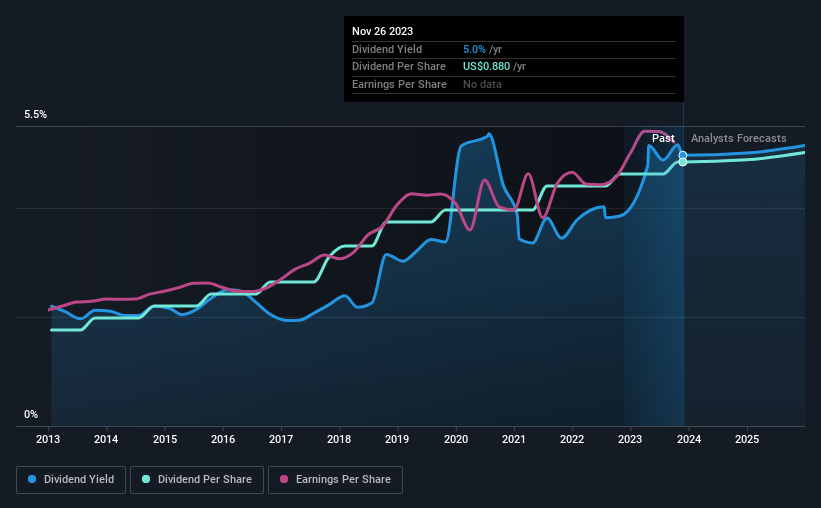Should You Buy Associated Banc-Corp (NYSE:ASB) For Its Upcoming Dividend?
Associated Banc-Corp (NYSE:ASB) is about to trade ex-dividend in the next 3 days. The ex-dividend date is usually set to be one business day before the record date which is the cut-off date on which you must be present on the company's books as a shareholder in order to receive the dividend. The ex-dividend date is of consequence because whenever a stock is bought or sold, the trade takes at least two business day to settle. Accordingly, Associated Banc-Corp investors that purchase the stock on or after the 30th of November will not receive the dividend, which will be paid on the 15th of December.
The company's next dividend payment will be US$0.22 per share, on the back of last year when the company paid a total of US$0.88 to shareholders. Based on the last year's worth of payments, Associated Banc-Corp stock has a trailing yield of around 5.0% on the current share price of $17.73. Dividends are an important source of income to many shareholders, but the health of the business is crucial to maintaining those dividends. As a result, readers should always check whether Associated Banc-Corp has been able to grow its dividends, or if the dividend might be cut.
View our latest analysis for Associated Banc-Corp
Dividends are typically paid from company earnings. If a company pays more in dividends than it earned in profit, then the dividend could be unsustainable. Associated Banc-Corp paid out a comfortable 34% of its profit last year.
Generally speaking, the lower a company's payout ratios, the more resilient its dividend usually is.
Click here to see the company's payout ratio, plus analyst estimates of its future dividends.
Have Earnings And Dividends Been Growing?
Companies with consistently growing earnings per share generally make the best dividend stocks, as they usually find it easier to grow dividends per share. Investors love dividends, so if earnings fall and the dividend is reduced, expect a stock to be sold off heavily at the same time. Fortunately for readers, Associated Banc-Corp's earnings per share have been growing at 11% a year for the past five years.
The main way most investors will assess a company's dividend prospects is by checking the historical rate of dividend growth. Associated Banc-Corp has delivered 11% dividend growth per year on average over the past 10 years. Both per-share earnings and dividends have both been growing rapidly in recent times, which is great to see.
To Sum It Up
Is Associated Banc-Corp worth buying for its dividend? Companies like Associated Banc-Corp that are growing rapidly and paying out a low fraction of earnings, are usually reinvesting heavily in their business. This is one of the most attractive investment combinations under this analysis, as it can create substantial value for investors over the long run. In summary, Associated Banc-Corp appears to have some promise as a dividend stock, and we'd suggest taking a closer look at it.
Curious what other investors think of Associated Banc-Corp? See what analysts are forecasting, with this visualisation of its historical and future estimated earnings and cash flow.
If you're in the market for strong dividend payers, we recommend checking our selection of top dividend stocks.
Have feedback on this article? Concerned about the content? Get in touch with us directly. Alternatively, email editorial-team (at) simplywallst.com.
This article by Simply Wall St is general in nature. We provide commentary based on historical data and analyst forecasts only using an unbiased methodology and our articles are not intended to be financial advice. It does not constitute a recommendation to buy or sell any stock, and does not take account of your objectives, or your financial situation. We aim to bring you long-term focused analysis driven by fundamental data. Note that our analysis may not factor in the latest price-sensitive company announcements or qualitative material. Simply Wall St has no position in any stocks mentioned.

